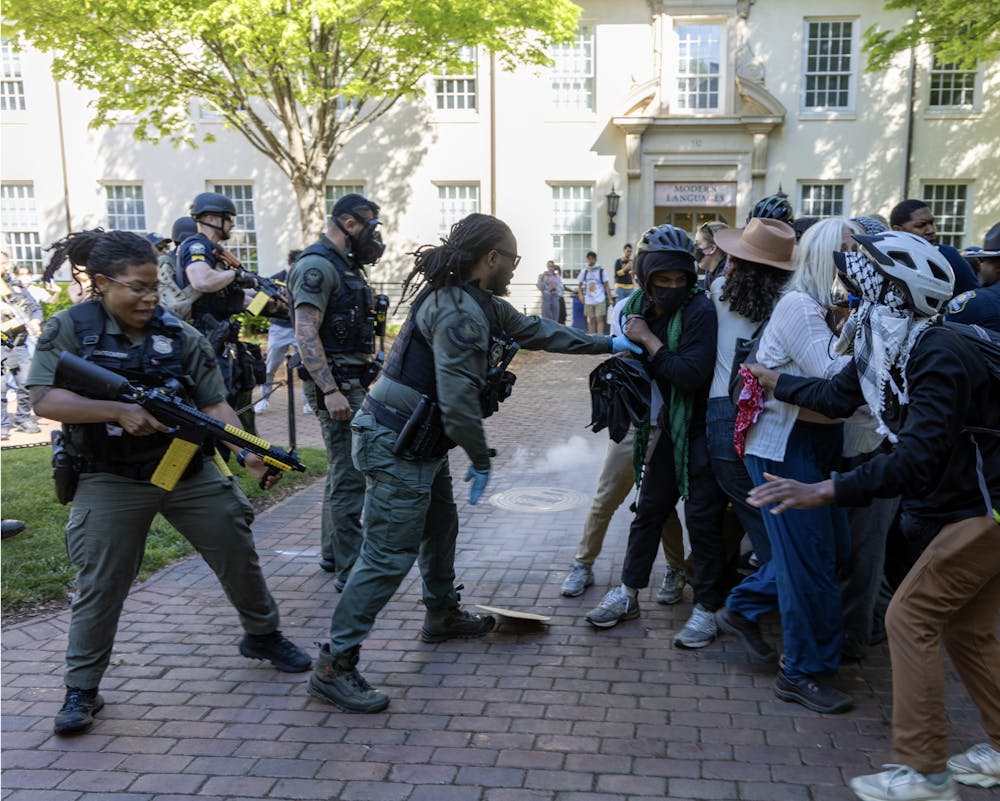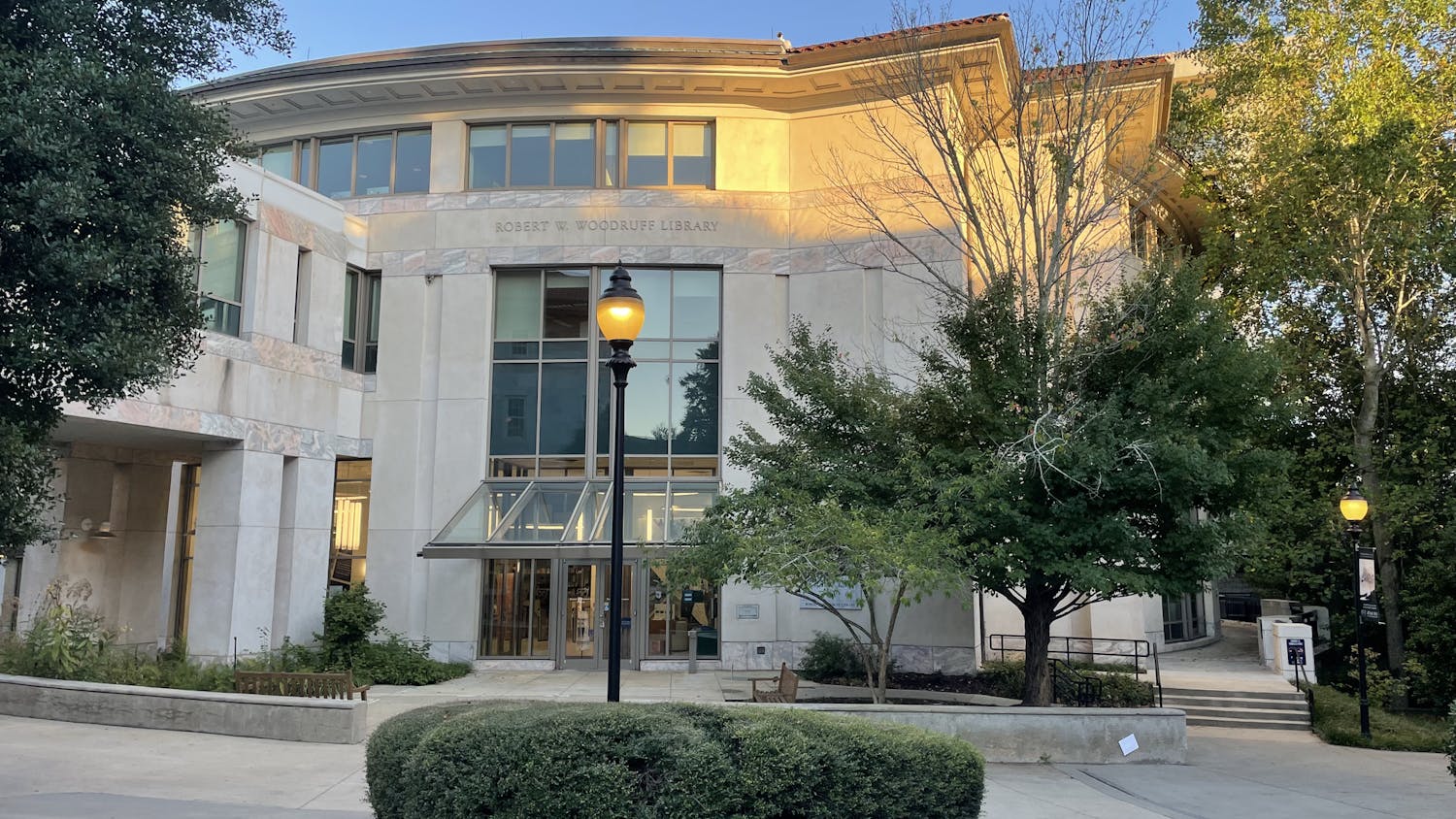It is not an exaggeration to say that Emory University’s campus has been a haunted place for many community members since April 25, 2024. Now, nearly a year later, I am still waiting for Emory administrators to take concrete steps to address and remedy the events of that day to rebuild trust on campus.
I am a researcher with 20 years of experience in higher education, 10 of which I have spent at Emory as a philosophy professor. Around 11 a.m. on April 25, 2024, a heavily-armed police officer pointed a long gun at my forehead and threatened me with arrest on my own campus as police rounded up our students and colleagues near the Administration Building.
My mistake was trying to help a student arrestee, who, having recognized me amid the chaos, was shouting out their parent’s phone number for me to call. The weapon was a pepperball gun that had been used on protestors, though at the time I thought it was a gun with real bullets. Either way, I was terrified.
Following the trauma I had endured that day on campus, I obtained medical accommodations to teach and work remotely during the past fall semester. But, it is one thing to have a global pandemic or catastrophic climate event confine me to online teaching. It is quite another to do so because the leaders of our university have made me feel unsafe on this campus.
To be clear, the encampment on Emory’s campus, just like nearly all pro-Palestinian campus protests, was peaceful. The groups being violent were the Emory Police Department (EPD), Atlanta Police Department (APD) and Georgia State Patrol. The latter two used violent military dispersion tactics, pepper bullets, chemical irritants and tasers against peaceful protestors and others who happened to be on the University Quadrangle at the time. Within an hour, the police had arrested 28 people, including three Emory faculty members, one of whom is the Department of Philosophy Chair and Professor Noelle McAfee. She had simply refused to walk away as a police officer was pummeling a student in front of her on the Quad. At least two other faculty members and dozens of students were dragged to the ground, and in a video that went viral, police repeatedly tased one protester. Most of the arrestees are Emory community members and a majority continue to face charges today. McAfee said she, along with others, could remain in judicial limbo for up to two years.
These experiences of police brutality and repression of free speech on campus in April were among the reasons why I cast a vote of “no confidence” in University President Gregory Fenves last May, along with 73.5% of undergraduate students and 75.05% of Emory College of Arts and Sciences faculty members who voted in referendums on their confidence in Fenves.
The APD had shown up on our campus to interrupt peaceful protests before. On April 25, 2011, police arrested seven people for criminal trespass while they were protesting Emory’s food vendor on campus. And, just two years ago, Emory students had staged a peaceful campus protest against the multimillion-dollar Atlanta Public Safety Training Center, colloquially known as Cop City. In the middle of that night, EPD and APD arrived and threatened our students with arrests. Emory faculty tried to intervene by publishing an open letter in The Emory Wheel, condemning the police escalation on our campus and inviting Emory to reconsider its relationship with the police on and off campus. Unfortunately, efforts to establish a dialogue between administration, faculty and students to foster a healthy environment for open expression were met with silence two years ago.
On March 20, the University released an updated Open Expression Policy. Despite revisions made in consultation with the University Senate and student governments, we cannot trust that Fenves and other Emory administrators will not repeat the scenes from April 25 under the revised Open Expression Policy. In fact, Fenves has stated that he would permit the arrests of students again if given the same information.
Faced with a federal government intent on quashing critical thinking and free expression, it is now more important than ever for us to think about how to handle dissent on campus. Last month, Emory entered into a resolution argument with the Department of Education’s Office of Civil Rights on a Title VI complaint of discrimination against Muslim, Arab, Palestinian and Black students. To protect targeted community members, revising the Open Expression Policy is not enough. For starters, it is crucial that the Emory administration reinstate Umaymah Mohammad, a Palestinian-American graduate student at Emory, who the University suspended for expressing her views.
When the administration called the city and state police on dissenters on campus, it jeopardized our academic integrity. An institution of higher education is successful to the extent that all community members trust each other. We ought to feel physically and mentally safe “to create, preserve, teach, and apply knowledge in the service of humanity,” as stated in Emory’s mission. But, such activity requires an environment of trust and openness, not one where the institution itself instills fear and violence.
Minimally, Emory must request that charges be dropped against all 28 people arrested on Emory’s campus on April 25. In addition, Emory administrators, notably Fenves and the University Board of Trustees, must issue a public apology addressed to every community member physically and mentally harmed by police brutality on campus.
I remain worried about the future of our campus life because I have not seen the University take any concrete steps toward mending the trust that it broke with its various community members on April 25. To regain our confidence, the Emory administration must immediately act to address these outstanding trust issues on our campus. Their actions now will determine if Emory can weather the current and upcoming challenges to higher education.
Contact Dr. Dilek Huseyinzadegan at dhuseyi@emory.edu.








